SPECIALSpecial Feature
- HOME
- Special Feature
- SPECIAL INTERVIEW
SPECIAL INTERVIEW
What kind of professionals is the WISE Program to foster AI Professionals for Marine Industries trying to cultivate? We asked the faculty members leading the program to answer this question and to share their own experiences.
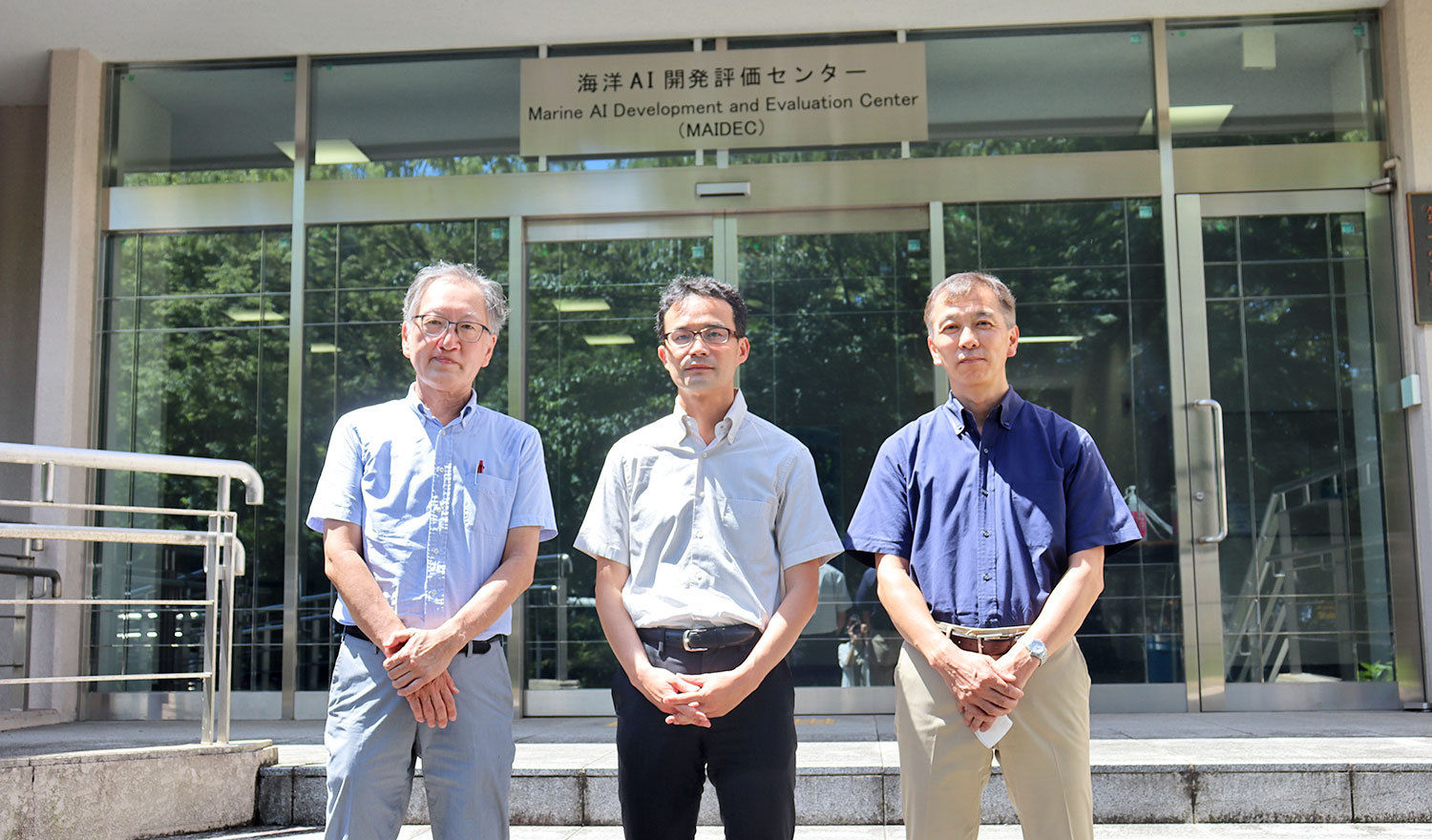
How will AI open up new fields in the marine industry?
AI will create value that drives marine industries on a global scale.
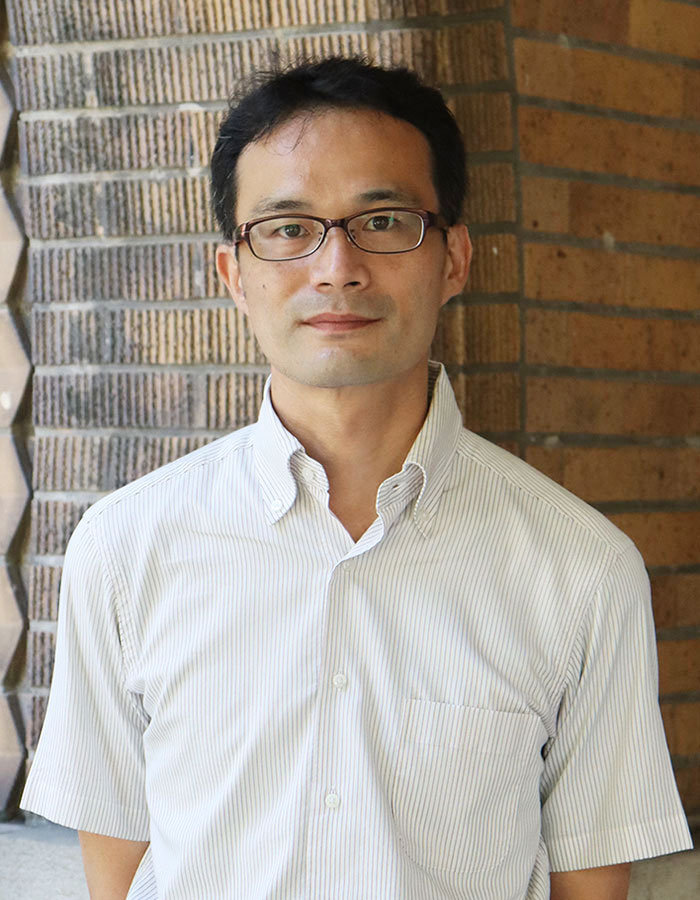
-
竹縄 知之TAKENAWA,Tomoyuki
Department of Logistics and Information Engineering, Professor
Head of program
Vice Director of MAIDEC
In charge of common course "Deep learning"【Research fields】
Mathematical analysis
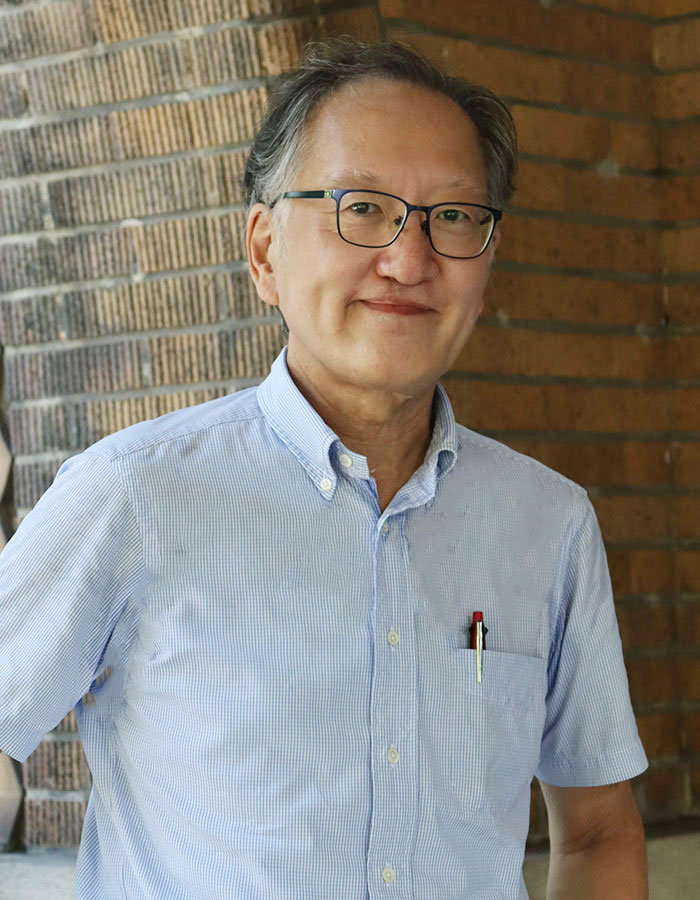
-
兵藤 哲朗HYODO,Tetsuro
Department of Logistics and Information Engineering, Professor
In charge of common courses "Data engineering", "Marine AI workshop"【Research fields】
City planning, Traffic engineering, Logistics plannig
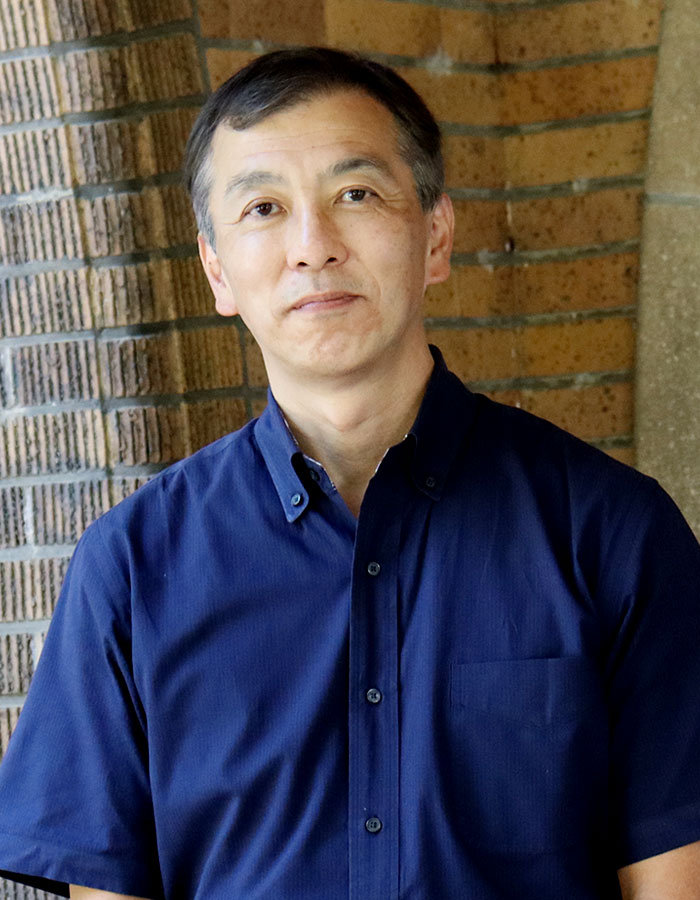
-
木野 亨KINO,Toru
Marine AI Development and Evaluation Center, Specially Appointed Associate Professor
In charge of common course "Marine AI workshop"【Brief work history】
In charge of planning, development, operation, overseas business development and collaboration with overseas venture companies at a private ICT company. Incumbent since April 2021.
On Developing AI Professionals in Marine "Industries"
KINOProfessor Takenawa, what does an "AI professional for marine industries" look like, and what role will they play in society?
TAKENAWAI think of them as people who can conduct applied research on AI in the various marine-centric industrial fields that TUMSAT is involved in. After completing the program and receiving their doctoral degree, I expect them to see success as researchers or engineers specializing in AI or data science with a focus on the ocean. I could even see them succeeding as policy makers by leveraging their insights on these areas.
KINOProfessor Hyodo, how would you answer this question?
HYODOThis WISE Program to foster AI Professionals for Marine Industries is the very essence of the Tokyo University of Marine Science and Technology. Broadly speaking, TUMSAT is divided into two campuses, the former Tokyo University of Mercantile Marine in Etchujima and the former Tokyo University of Fisheries in Shinagawa. The program spans both campuses, as it is being implemented on a university-wide basis.
The most notable aspect of this program, which deals with not only ships but also core fisheries technologies such as genome editing, is that it is truly being advanced by both campuses in tandem.
KINOThank you. I agree with the idea of fostering AI professionals for marine industries, but what I particularly like is the word "industries" in the program. Simply calling the program "marine AI professionals" makes it sounds very technical. Including the word "industries," however, makes it sound like the program is fostering professionals who will lead the way as AI drastically changes a wide variety of industries including the marine field. It really struck a chord with me.
TAKENAWADoes that mean that they are not only researchers, but also industry professionals?
KINOStaying in the lab as a professional is one viable career path, but I think the expectation is that these individuals will be able to change the marine industry and drive it forward, including as a researcher.
Marine AI potential
In relation to what both of you have just said, how do you think AI and big data will be utilized in the future in your respective fields of expertise? And how do you think society will change as a result?
HYODOI specialize in the civil engineering field of transportation planning. With the development of information and communications technologies, a wide variety of big data have appeared in the transportation field in recent decades. One notable example is that it has become possible to analyze the location data of cell phones and smartphones to see, for example, the percentage change of people around Tokyo Station today compared with last week. This is the data of cellphone and smartphone owners, so it's big data on the scale of tens of millions of people. When it comes to AI, the most obvious example in the field of transportation is automated driving. It's still a long way off, but when fully automated driving becomes a reality, people won't have to own their own cars. The number of car owners is likely to decrease. It has been pointed out that this will greatly change cities and urban planning by, among other things, eliminating the need for most parking lots and allowing space to be used more effectively. There is a lot of discussion these days about the possibility that AI technology will change the entire world.
KINOHow would you answer this question, professor Takenawa?
TAKENAWAI am originally a mathematics specialist, but I would like to talk about AI.
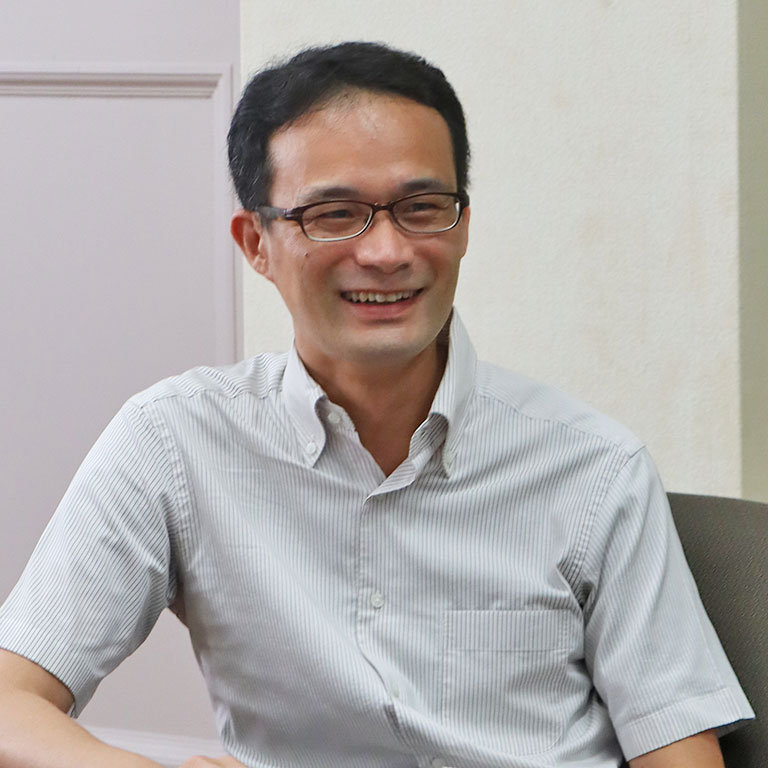 AI has an image of being a bit of a "black box," so it can be difficult to understand what it can be used for. However, AI has basically made it possible to acquire control methods from data, which means the same level of detailed knowledge is no long necessary, and that people no longer have to write everything. Current AI technology is useful in these ways.
AI has an image of being a bit of a "black box," so it can be difficult to understand what it can be used for. However, AI has basically made it possible to acquire control methods from data, which means the same level of detailed knowledge is no long necessary, and that people no longer have to write everything. Current AI technology is useful in these ways.
In the marine field, examples of uses for AI include automated ships, automated aquaculture, and the automation of things like sorting and distribution in food and logistics areas. I also believe that increased automation and improved performance of marine environment analysis and prediction will improve convenience. In the fisheries field, I think AI will allow for the quantitative prediction of the amount of environmental resources to some extent. This will make it possible to formulate policies that balance the natural environment and the fisheries industry.
KINOAI had its first and second booms in the 1970s and 1980s, respectively, but do you think that the current AI technology is the real deal? Is today's AI really a useful technology, or will it end up being a temporary trend?
TAKENAWAI do not think AI can do anything more amazing than people*. I think that it will be able to do something on the level of an engineer with some experience. In the case of automated driving mentioned by Professor Hyodo, skilled drivers are vastly outnumbered by people who are not that good at driving, so I think machines will become better drivers than people. I think this would have an impact on society.
*Reinforcement learning and learning combined with simulation can surpass human capabilities.
HYODOWhat makes this boom completely different from the previous ones is that it is based on big data. The amount of data is on a completely different scale. This is against the backdrop of deep learning using the massive amount of data flowing on the Internet, and, of course, increased computer performance, but AI today does not look like it did in the past. AI is already being used in quite a number of fields, so I get the impression that this use of AI will become the standard rather than just another boom.
KINOI previously did not have any experience in the marine field, but in a similar way, the use of AI has advanced rather far in agriculture. In a sense, I would say that AI has already been practically applied in agriculture. The wisdom and experience of agricultural experts and experienced farmers can be visualized using IT, and in turn AI can be used to save labor and automate production so that more farmers can produce higher-quality products. I feel this sort of thing will be the first practical application for AI in the fisheries industry, as well.
TAKENAWAFor example, when using AI to automate aquaculture, although the sensors and computers are not all that expensive, the labor costs make the total initial cost quite high. When you think about collecting a lot of data, you need a certain amount of scale to lower the cost, so eventually the market will become an oligopoly. I think the companies that win out will provide more or less same service to everyone. However, if universities are to be involved, they will be the ones that come up with the ideas, not the ones responsible for oligopolization of the market.
KINOOn a related note, what makes the marine field a little different from other industries is that marine resources are very much treated as a common property of humankind, i.e., a public good. In the case of agriculture, ownership and property rights are strictly defined, but the ocean is very much seen as a common resource.
To that end, I think that AI will be incredibly useful for helping everyone use these common resources in a fair and efficient way. I think it is important to make global ocean data available to the public. If the data is public, any entity or person, whether a country, organization, or individual, can find new insights by using the data to come up with ideas and modeling them with AI. This model is not really something that can be copied by other industries, and I think there is value in having universities involved.
Program's attraction
KINOThe program was adopted in FY2019 and welcomed its first students last year in AY2020. What do you think is the program's attraction? Let's start with the program director, Professor Takenawa.
TAKENAWAFirst and foremost is the fact that students can acquire the latest knowledge of AI in a practical manner. Development of the fields of data science and AI over the past decade has been so remarkable that it is quite difficult for any individual to keep up. However, by combining the knowledge they gain in their laboratories with the knowledge of data science and AI they gain through this program, students will be able to experience AI implementation. For that reason, we provide students with a lot of support, including the marine AI student study sessions and the mentor system. Through these, students will be stimulated and advised by other program students.
KINOThank you.
HYODOI largely agree with what Professor Takenawa has said, but I really want to emphasize the level of care that program students receive.
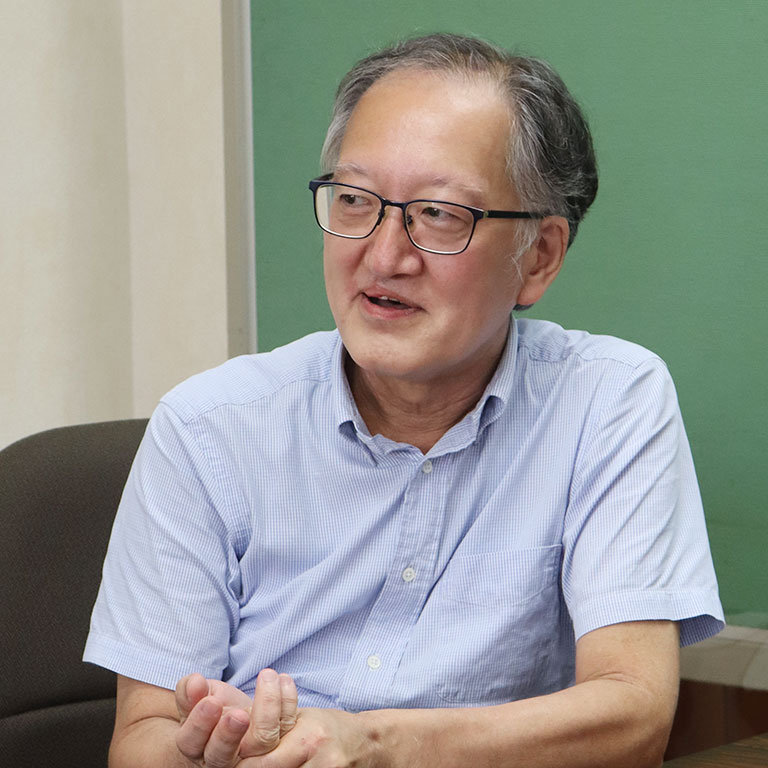
I myself spent two years in a master's program and three years in a doctoral program, but I had so few classmates that I sometimes felt lonely, especially during the doctorate. In short, I was in an environment where I didn't really know anyone outside of my laboratory.
One feature of this program, however, is the strong support from the faculty and staff, which allows program students to focus on their research with peace of mind. Participating students are also provided with a variety of means to maintain a sense of solidarity with each other, most notably the study sessions led by Professor Takenawa. This allows them to form a community that is different from ordinary doctoral programs. The community that you develop as a doctoral student is a lifelong asset, so I see this as being one of the most notable features of the program.
KINOWhat I like about the WISE Program is that it is not just our university fostering professionals. We have also formed a consortium with some of Japan's leading research institutions in the field of marine science and technology as well as private companies, which are all working with us to support the students. The same is true for the internships. It may only be a small exaggeration to say that we are fostering AI professionals for marine industries on an all-Japan basis. If I were a student, I would really want to participate in this program because it has the entire country working together to develop professionals. That's what I find attractive about it.
Building a Better Program
Developing AI professionals for marine industries is a very high bar you have set for yourselves. I'm sure there are still many challenges and hardships in training students to become such professionals. What are your thoughts on such difficulties, especially given the impact of the current COVID-19 pandemic?
TAKENAWALast academic year, I only had one lecture on deep learning, so I didn't have a good view of the whole situation. However, when I had a chance to interact with the students during committee visits last fall, I realized that there was a huge gap between the level of understanding lectures and the level of actually implementing AI in one's own research, so I started thinking about how to fill this gap. In laboratories with a long history, students can refer to programs written by students who came before them, but since the WISE Program is still in its first year, we don't have any such programs for students to refer to. As such, I am trying my best to bridge this gap.
HYODOI myself instructed a class called Data Engineering for the first time last year. This is an omnibus class taught by a total of 10 instructors, including six internal faculty members and four part-time lecturers. Each class session was on a completely different field, so it was a great learning experience for me. In particular, I learned a lot in the class on genome editing, which was completely new to me. I think this was also true for the students. Also, last year we had remote classes. We originally we wanted to have students from both campuses take the class together on the same campus, but that was not possible. As I mentioned earlier, we have two campuses, so we want to emphasize the importance of back-and-forth exchanges. This intermingling between the two campuses is one of the most significant elements of the WISE Program, so I think it would be meaningful if we could promote exchange not only between students but also between faculty members.
The WISE Program and Graduate Education Reform
KINOProfessor Hyodo, what do you think about the role of the WISE Program in graduate education reform?
HYODOI think its primary role is to create a highly attractive doctoral program. This is because expanding the talent base in the doctoral programs of not only TUMSAT but all Japanese universities is essential for improving the country's international research capabilities. The WISE Program is expected to be a driving force in this area. Another role is "social implementation." This program is strongly conscious of collaboration with the real world, especially the various institutions of the consortium. I think this is also connected to what you said earlier about the industrial element being important. Although this applies both to doctoral and master's programs, I think refining students' ability to further their research careers in the real world is a big part of graduate education reform.
It is often said that is not enough that someone is able to do research, but that they must be able to find points of contact with society where they can give back through the techniques and methods they develop. In other words, they need to be able to coordinate their research. I would like to make fostering professionals who can do that as the pillar of this program.
KINODo you mean to say that post-doctoral career prospects are limited?
HYODOThis is true for traditional educational posts at universities, which are few and far between. This is why we want to foster professionals who can make use of what they develop in society. I believe this program emphasizes this as a viable career path.
TAKENAWAIn the program's internships and residencies, supervisors give students problems that they have to solve or mitigate by using their knowledge of AI while also choosing the best methods. When they are only working on their own research themes, these students may only tackle one or two problems over a few years, so they do not work on a wide variety of problems. However, in a residency or internship, they are able to experience this sort of thing working inside of a company. These experiences will be very helpful in their future.
KINOThe other day, I asked a person from a venture company what they expect from someone who has completed a doctoral program. He replied, "I want someone who can bring something new to the venture company, rather than someone who does what they are told to do perfectly." I think that specialization will come in handy especially in the marine field. I expect that there will be many opportunities for graduates of this program to succeed in the private sector. I think that people who can master the specialized field of marine science and technology and AI tools are quite valuable.
Prospects
Next, I would like to ask you about the future plans and prospects for the WISE Program.Firstly, I would like to ask Professor Takenawa.
TAKENAWACurrently, we are in the process of learning as a program through experience by conducting various research projects on AI implementation. As our students advance to the doctoral program and accumulate insights, we hope to become an organization that makes people think "The Tokyo University of Marine Science and Technology can answer any question about marine AI."
HYODOFY2024. Until then, we will have to continue strengthening the program's foundation. In the meantime, we will continue to hold various seminars, symposiums, and study sessions on marine AI, so I think we will be able to make the existence of this program known worldwide, just as Professor Takenawa has said. Also, the program is scheduled to be upgraded to a graduate major in 2026. I would like to develop this program into one with a proven track record with the aim of establishing it as a new graduate major.
KINOThank you.
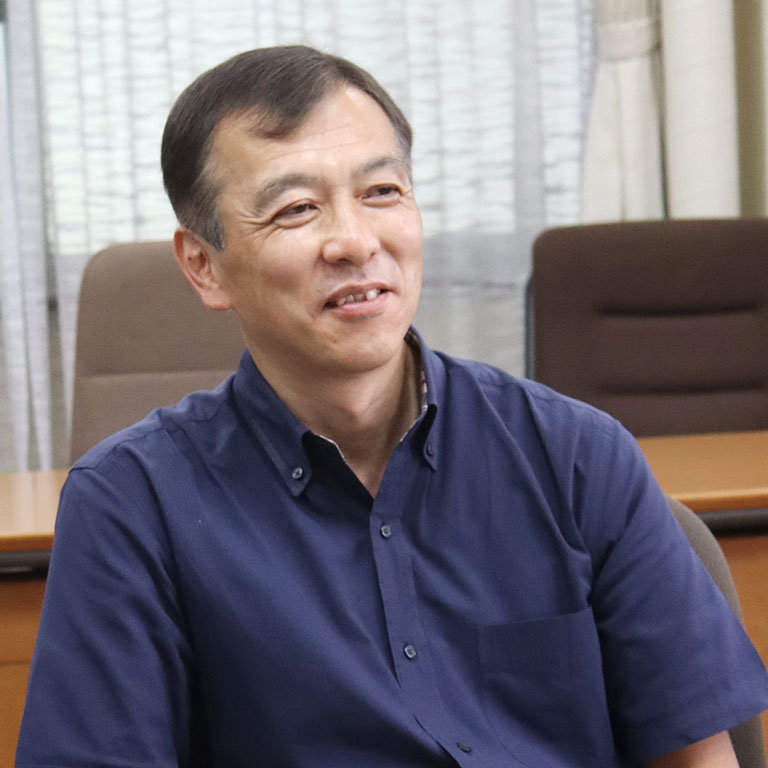 The students who joined the program in AY2020 will complete their doctoral programs in For my part, I would like to focus more on overseas internships, workshops that include international students, and other elements of our effort to develop professionals who can succeed anywhere in the world.
The students who joined the program in AY2020 will complete their doctoral programs in For my part, I would like to focus more on overseas internships, workshops that include international students, and other elements of our effort to develop professionals who can succeed anywhere in the world.
I believe that cross-cultural communication skills require a lot of experience and familiarity. If students can get that experience while they are still in school, they will be able to achieve great professional success in society. I would like to contribute to providing such opportunities as much as possible.
For current and future program students
KINOMoving on to my last question, what are your expectations for current and future program students? Then, Professor Takenawa please.
TAKENAWAThe fact that our WISE Program was adopted shows that society has a demand for the implementation of data science and AI in the marine field. Not only that, but the field is also interesting in that given that it is almost untouched, we will be able to immediately see both good and bad results. My expectation for program students is that they will become professionals who can immediately succeed in society as long as they actively enjoy the research they do in graduate school.
HYODOOne notable feature of this program is that it requires students to be enrolled in doctoral programs for three years. I myself spent three years during my twenties in a doctoral program, an experience that has become a lifelong treasure for me. The time in my twenties I spent doing intensive research became an asset for me. Doctoral students may have an image of spending all day in a laboratory reading books or staring at a computer, as was actually the case for myself. However, as I mentioned earlier, our program offers a variety of support services to help make life as a research student more open to the outside world than ever before. Also, our campuses are located in Shinagawa and Etchujima in the heart of the global metropolis of Tokyo. This means students can be receive innumerable stimuli both on and off campus. I hope that students will take advantage of this to the fullest during their time as graduate students.
KINOI do not have any graduate school experience myself, but I did train at an overseas company for about two years when I was young. A boss I respected told me, "Don't think that this experience will be useful right after you go back to Japan. It will be very useful in about ten years, though." I did not really understand what these words meant at the time, but they really stuck in my mind.
After these two hard years overseas, I returned to Japan and spent around a decade working on various projects. It was only then that I encountered a situation where my overseas experience came in handy. I sudden realized what those words had meant. That is why I now tell young people that they should experience a lot of different things while they can and not become impatient if they do not see results right away. I want students to spend the five years of this program with the feeling that the experience will be useful in ten years.
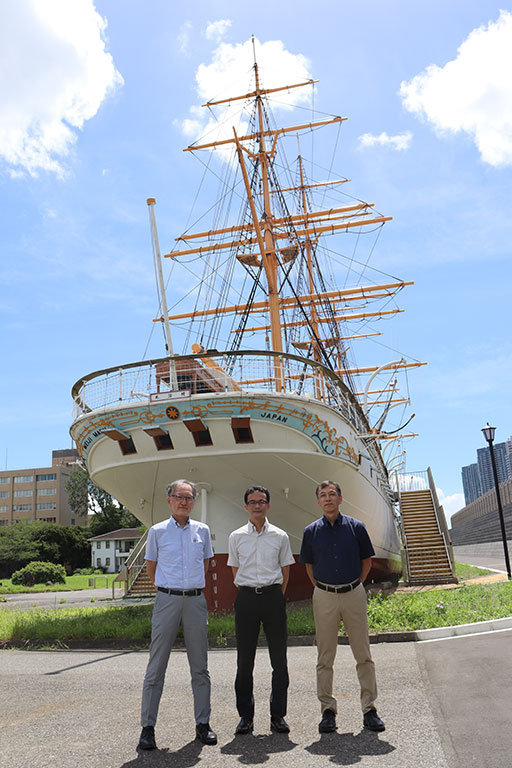
In front of the important cultural property Meijimaru

